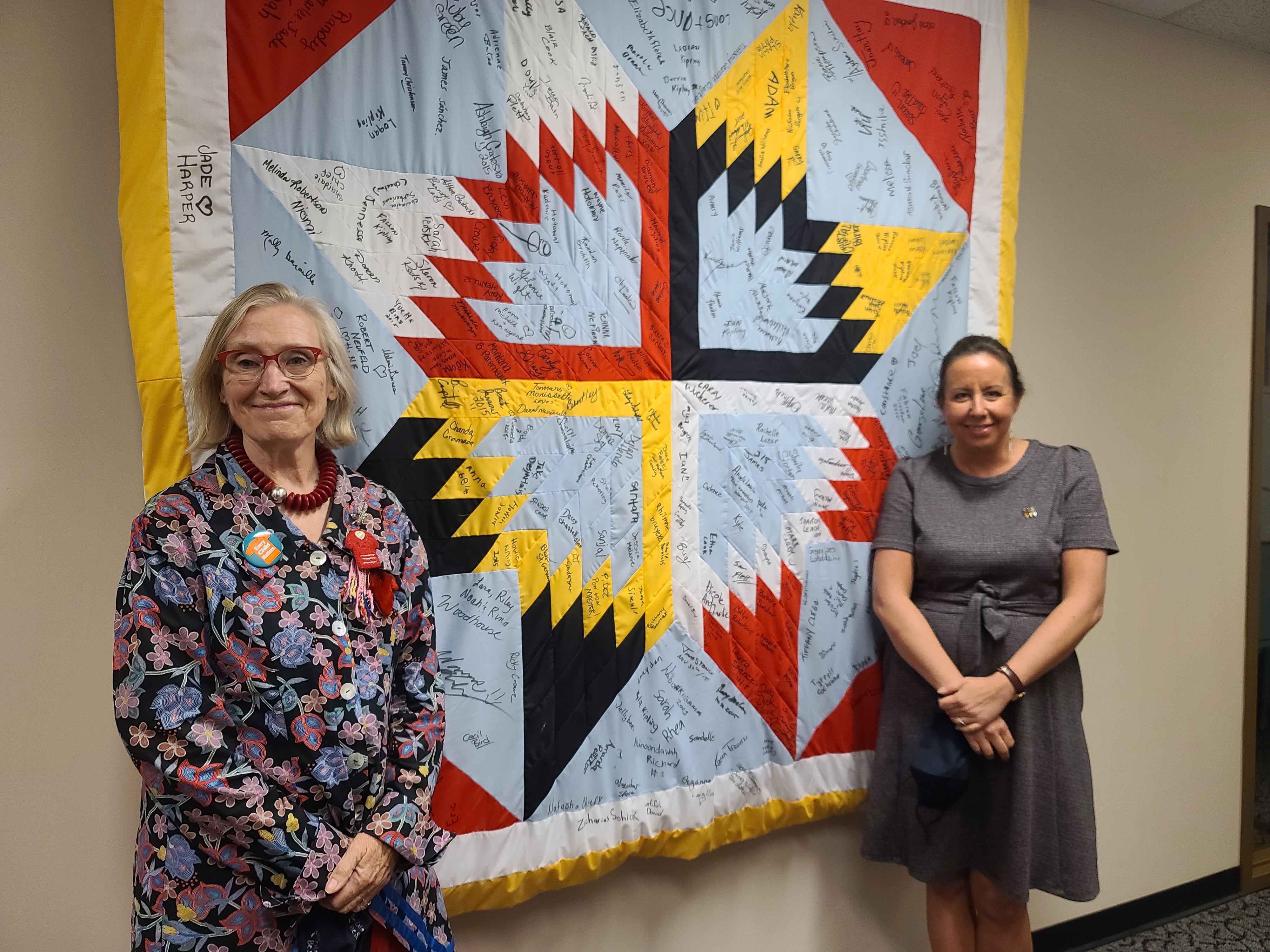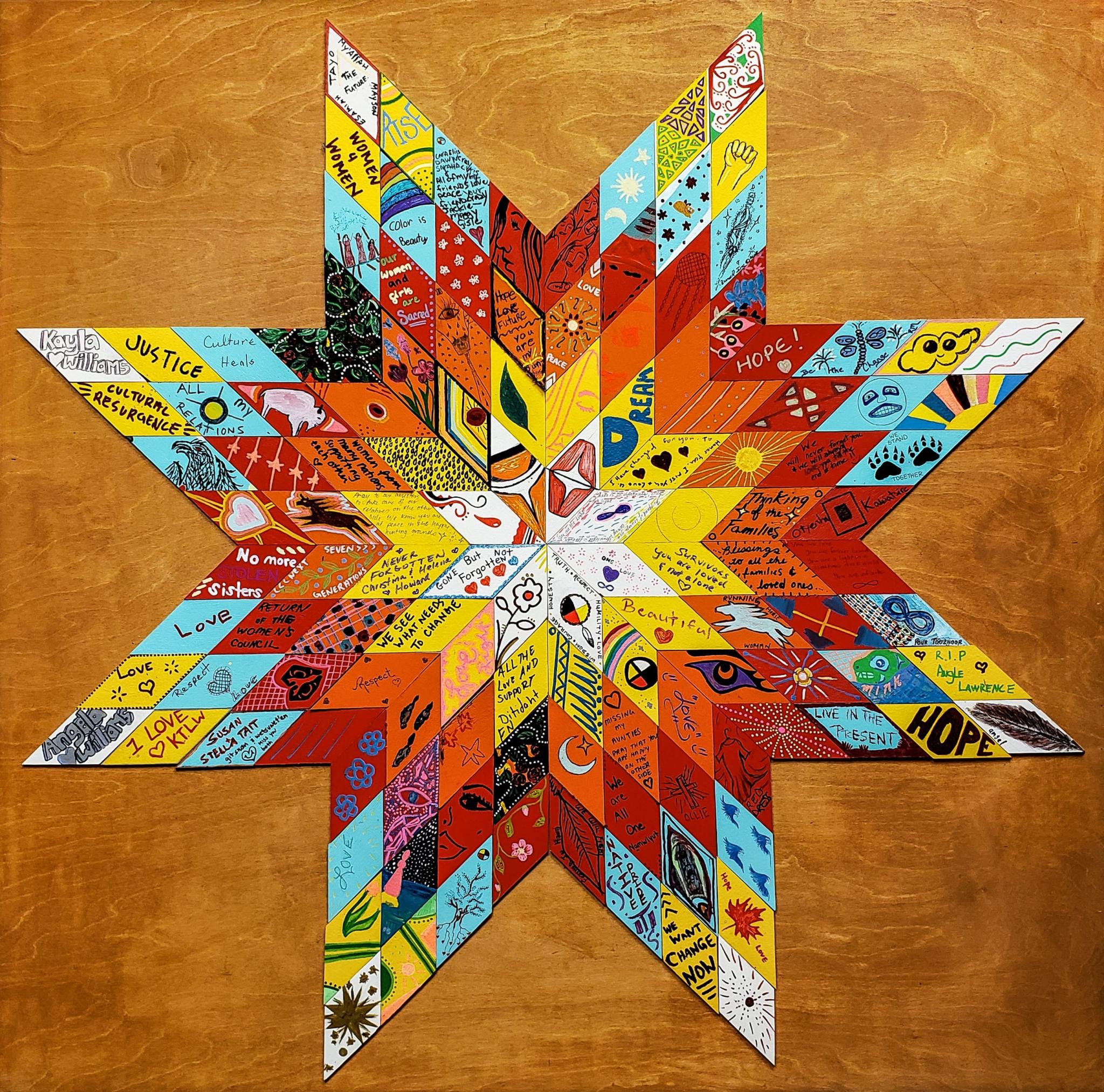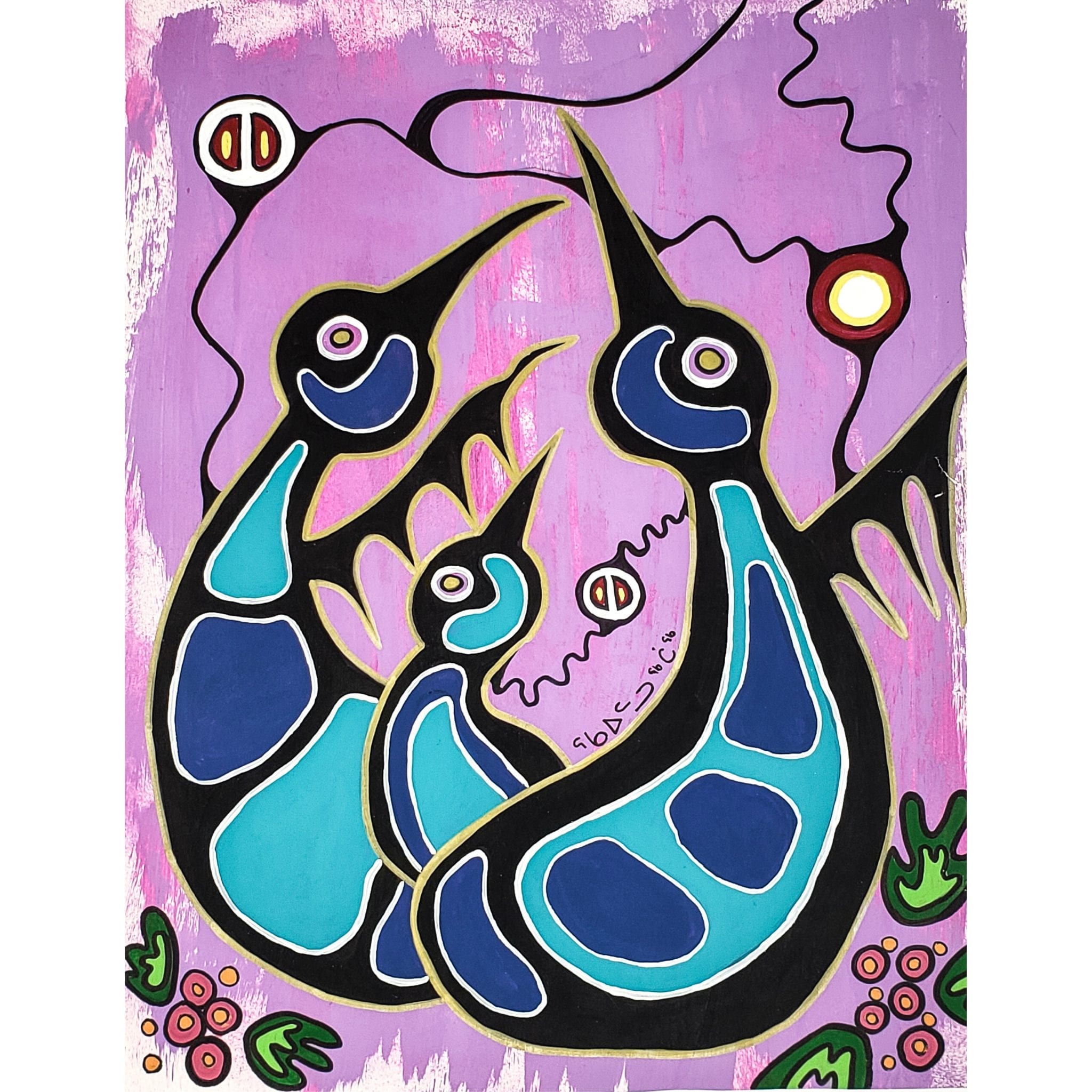Changing the Stories We Tell – about ourselves and each other
Posted on May 2, 2022

By Bonnie Schiedel
Published on Lakehead University’s Alumni Spotlight.
Dr.Karine Duhamel (BEd’05) was the kind of kid who would get so lost in a book she’d miss her bus stop, riding all the way to the end of the route before she looked up.
Today, her enthusiasm for discovering people’s stories continues unabated.
“I’m always looking for a place where I can make a difference,” says Karine, who is of Anishinaabe-Métis heritage. “All of the positions I’ve held connect to a passion for education, history, and service.”
Karine is a special advisor/manager for Crown-Indigenous Relations and Northern Affairs Canada—a federal department responsible for policies related to Indigenous peoples and Canada’s northern lands and territories.
InCanada, statistics show that Indigenous women and girls are 12 timesmore likely to be murdered or missing than any other women in Canada.
It’sa natural progression for Karine who’s been advocating for Indigenous people for many years, including as the Curator for Indigenous Content at the Canadian Museum for Human Rights in Winnipeg.
“The realities Indigenous people face are shaped by colonial structures that we sometimes cannot see,” she explains. “This can lead to situations in which individuals become targets of violence or harm, like having to live in unsafe places or struggling to make ends meet.”
Karine has been doing her best to change this. In 2018 and 2019, she was the Director of Research for the National Inquiry into Missing and Murdered Indigenous Women and Girls (MMIWG).
“Sitting with family members and survivors and listening to them tell you about the worst thing that
you can ever imagine happening was really life-changing,” Karine says.

Karine with former Minister of Crown-Indigenous Relations Carolyn Bennett
in August 2021 at a new MMIWG funding announcement.
In Reclaiming Power and Place: The Final Report of the National Inquiry into Missing and Murdered Indigenous Women and Girls, the authors noted:
“In Canada, statistics show that Indigenous women and girls are 12 times more likely to be murdered or missing than any other women in Canada…A risk of such magnitude requires us all to take responsibility, to clearly identify the issue and to take strong measures to address this situation, which is rooted in Canada’s historical and political context.”
Karine helped write the MMIWG final report, as well as managed its forensic document review project and the Inquiry’s Legacy Archive. It gave her insight into the significance of lived experience.
“We are often at a loss about how to confront big societal issues, but the solutions must lie with those who are most affected. They know what needs to be done, but they need the proper resources and supports to do the work in culturally relevant and Indigenous-led ways.”
Finding a Mission
Karine’s sense of purpose has evolved over time. While studying for her undergrad degree at Mount Allison University, she initially pursued sociology, but switched to history and political science after taking a fascinating course about federalism. “It raised all kinds of interesting questions about Canada and how we came to be who we are, especially in relation to Indigenous-Crown relationships” she says.
Before completing an MA and PhD in history at the University of Manitoba, Karine earned a Bachelor of Education at Lakehead.
“I was attracted to the program because of its condensed and intensive nature,” she says. Her instructors made an impression as well. “I remember good professors who were committed to new ways of doing things.”
Learning how to teach physical education was a standout moment for Karine. As a child, she recalls being really bad at any kind of physical activity. “The course made me realize that I’d been telling myself the wrong story all my life because, it turns out, I’m actually not terrible at sports. I ended up starting gymnastics when I was 33 and ringette when I was 39.”

Art is a powerful tool for commemoration and the National Inquiry into MMIWG was gifted hundreds of artistic expressions throughout the Truth Gathering Process. This Community Art Piece from their collection is a mosaic in the style of a Star Blanket with each of its 128 tiles painted by survivors and families of MMIWG during the Vancouver Community Hearings. The activity was led by Jessica Slater, a Cree artist, and was made at Saa-ust Centre in Vancouver, a pop-up location for statement gathering during the hearings.
Image courtesy of the National Inquiry into MMIWG’s Legacy Archive.
Another reason Karine came to Lakehead was to spend more time with her maternal grandfather in Thunder Bay. Over the years, she’d heard bits and pieces about family members and ancestors who were Indigenous, Métis, and non-Indigenous.
“Like many families, my female ancestors—my grandma and my great-grandma—were disenfranchised. Their treaty rights
were commuted because they married out of the community. It was a period when the government was really focused on assimilation and, like many people of the day, my relatives tried to blend in if they could. Thunder Bay hasn’t historically been a very safe place for lots of Indigenous people.”
After Karine completed her doctorate examining the history of pan-Indigenous rights movements in Canadian and international settings, she sought out positions to deepen her knowledge. As director of research at a Winnipeg law firm, she worked with residential school survivors. As a program manager for Canada’s National History Society, she helped develop an Indigenization strategy for their programs, collaborating with youth on history projects.
Her work in education continued as an adjunct faculty instructor at the University of Winnipeg. “I developed and taught courses about residential schools and their legacy. That was a neat thing to get off the ground, because it was one of the first to be offered.”
Signs of Hope
Karine points to major social developments in the years since her undergrad degree that have transformed our understanding of how history is taught: the release of the Truth and Reconciliation Commission of Canada’s 94
Calls to Action, class-action cases over the forced sterilization of Indigenous women, and the release of MMIWG’s final report.
“We know from family members and survivors that being connected to their culture can represent safety,” Karine says. “So, initiatives are underway to help young people—and those who have been separated from their culture—to reclaim and revitalize it. Communities are designing and implementing solutions in areas that matter most to them, notably in early childhood education and cultural education.”
Her role as Public Programs Curator and Manager at the Canadian Museum for Human Rights was another way that Karine was able to help present a clearer picture of Canada’s past and present.
“I worked directly with community members to develop insights into historical events from Indigenous perspectives. I got to travel all over the country to interview and work with elders and knowledge keepers and conduct exciting research.”
Wendy Rinella, CEO of the Oakville Community Foundation, who first met Karine at a museum conference, says: “I was
impressed by her breadth of knowledge and her ability to distill very complex ideas into understandable terms.”
Wendy is now working with Karine as part of an advisory council leading an initiative called “Debwewin”– the Oakville Truth Project (Debwewin is the Anishnabek term for “truth”), which has the goal of furthering a shared understanding of Oakville’s Indigenous past and supporting local Truth and Reconciliation work. “Dr. Duhamel has been just phenomenal in helping us
put that together.”
“One of the things that I really admire about Karine is her ability to build relationships,” observes Dr. Erin Whitmore, the Executive Director of the Ending Violence Association of Canada, who worked with Karine as a senior researcher at the National Inquiry into MMIWG. “It wasn’t just about hearing people’s experiences but ensuring there was a sense of relationship. Karine recognized the responsibility that came with hearing stories from families who have been impacted by violence.”
Indeed, Karine’s work with families dealing with the loss or disappearance of a loved one had a profound effect on her.
“I learned so much more from my National Inquiry family than I was able to
offer them. It’s a responsibility and a debt that I try to repay by
going out and speaking about my experience with the Inquiry, and by
working in government to implement the Calls for Justice.”
For example, in Karine’s current role with Crown-Indigenous Relations and
Northern Affairs Canada, she’s helping government departments implement
the Federal Pathway, which defines the Government of Canada’s commitments to ending violence against Indigenous women, girls, and 2SLGBTQQIA+ people.
Karine gives many public talks because she strongly believes in the power of education. That’s why she is pleased that elementary and high school teachers are now beginning to provide students with a fuller understanding of Canada’s history.
Times are Changing
Karine’s collaboration with the MMIWG Secretariat continues to inspire her, but it also requires patience.
“There’s a lot of work underway,” she says. “But change is very slow. I think transformative change, changing not just what we’re doing, but how we’re doing it, takes generations. The ‘get it done’ part of me is sometimes frustrated by bureaucracy. But the passion I have for the work we do and the families who are still looking for justice for their relatives drives me to focus on implementing the Calls for Justice so that people can be safe.”
One way to achieve this is by recognizing individuals’ uniqueness.
“There’s a tendency in research and public policy to ‘pan-indigenize’ Indigenous communities and smooth out the distinctions in their experiences,” she notes. “But the barriers facing an Inuit woman in Igloolik are different from those facing a Métis woman in Winnipeg. We need to recognize that and recognize the expertise of communities and community members.”

Motherly Love was painted and donated by Dee-Jay Monika Rumbolt, whose name in Iniktiut is Snowbird, from Port Hope Simpson, Newfoundland. She is
Southern Inuit, German, and a member of the NunatuKavut Nation. Monika
donated “Motherly Love” at the Community Hearings in Happy Valley-Goose
Bay to reflect on her experience of growing up in a single parent family and to show the importance of keeping families together. Her mother worked three jobs to support and provide for Monika and her brother, often not eating herself as she could not afford enough food.
Image courtesy of the National Inquiry into MMIWG’s Legacy Archive.
Sharing her knowledge and skills, in part through her role on committees and boards like the Canadian Historical Association and the International Council on Archives Expert Group on Indigenous Matters continues to be essential to Karine. In addition, continuing to expand knowledge through these activities is crucial.
“Many Elders that I’ve met have talked about the fact that we live in a world made of gifts: the land, the waters, the relationships that we have are all gifts. Each of us individually also have gifts.”
“Our responsibility is to find out how we can use those gifts in the service of humanity at every scale: your community, your home, your children, and the wider world.”
Karine knows that by changing the stories Canadians tell about ourselves and our history, we can be better people. We can create a society where every child believes that when they grow up, they will be treated with kindness, and never violence.
- Oakville Fire hosts Cree Nation Fire Prevention Officer in
Mar 20 2025 by Courtney
- $30M advance land claims payment made to Mississaugas of
Mar 13 2025 by Courtney
- $30M advance land claims payment made to Mississaugas of
Mar 04 2025 by Courtney

